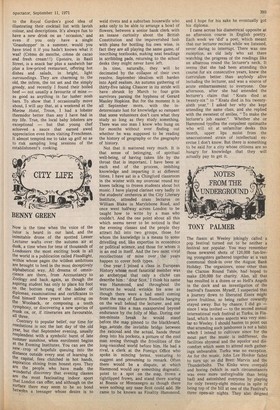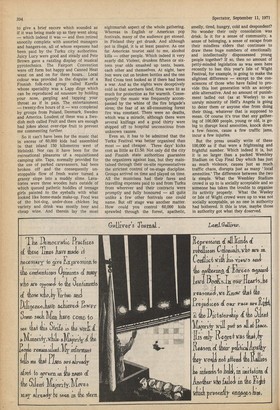NOTES FROM THE UNDERGROUND TONY PALMER
The fiasco at Weeley jokingly called a pop festival turned out to be neither a festival nor popular. You may remember those newsreel shots of 120,000 fun-loving youngsters gathered together at a vast communal think-in over the August Bank Holiday. The organizers, none other than the Clacton Round Table, had hoped to make £30,000 for charity. Alas, all that has resulted is a dozen or so Hell's Angels in the dock and an investigation of the festival's finances. Myself, I suspected that a journey down to liberated Essex might prove fruitless, so being rather cowardly stayed away. But by chance, I did go — since I was invited — to the second annual international rock festival at Turku, in Finland, which in some aspects was very similar to Weeley. I should hasten to point out that attending such jamborees is not a habit which I intend to cultivate since for the most part the music is indifferent, the facilities abysmal and the squalor and discomfort which seem to attend such gatherings unbearable. Turku was no exception. As for the music, John Lee Hooker failed to turn up; so did Brett Marvin and the Thunderbolts. The Kinks were overpaid and boring (which in such circumstances was even more unforgivable than being bad) and astonished everyone by playing for only twenty-eight minutes in spite of being top of the bill at one of the Festival's three open-air nights. They also deigned
to give a brief encore which sounded as if it was being made up as they went along — which indeed it was — and then retired snootily complete with assorted managers and hangers-on, all of whose expenses had been paid by the Turku city authorities. Juicy Lucy were good and steady and Pete Brown gave a razzling display of musical pyrotechnics. The Fairport Convention were off form but happy and Canned Heat went on and on for three hours. Local colour was provided in the disguise of a Finnish folk-rock group called Karelia whose speciality was a Lapp dirge which can be reproduced ad nauseam by holding your nose, gargling and tapping your throat as if in pain. The entertainment — twenty-five hours of it — was completed by groups from Poland, Denmark, Sweden and America. Loudest of these was a Swedish mob called Fruit and there are enough bad jokes about over-ripe fruit to prevent me commenting further.
So it can't have been for the music that in excess of 60,000 kids had assembled in that island 150 kilometres west of Helsinki. Nor can it have been for the recreational pleasures of a requisitioned camping site. Taps, normally provided for, the use of parked caravanners, had been broken off and the consequently unstoppable flow of fresh water turned a grassy slope into a muddy slime. Lavatories were three wooden huts outside of which queued pathetic huddles of teenage girls painted to the eyeballs with what looked like home-made make-up. Food was of the hot-dog, under-done chicken leg variety and drink was mostly beer and cheap wine. And therein lay the most nightmarish aspect of the whole gathering. Whereas in English or American pop festivals, many of the audience get stoned, in Finland they get drunk. And although pot is illegal, it is at least passive. As one fat American tourist said to me, alcohol kills — other people. Which indeed it very nearly did. Violent, drunken fifteen or sixteen year olds smashed up tents, buses, each other and themselves. At night, bare feet were cut on broken bottles and the one Red Cross tent looked as if there had been a war. And as the nights were deceptively cold in that northern land, fires were lit as much for protection as for warmth. Consequently the music was frequently accompanied by the whine of the fire brigade's siren; the fear of an all-consuming forest fire was constant. There were no deaths, which was a miracle, although there were several knifings and a good thirty were shipped off to hospital unconscious from unknown causes.
Even so, it has to be admitted that the Turku Festival was better organised than most — and cheaper. Three days' kicks cost as little as £1.50. Not only did the city and Finnish state authorities guarantee the organizers against loss, but they maintained through their on-site representatives the strictest control of on-stage discipline. Groups arrived on time and played on time. All the musicians had their fares and travelling expenses paid to and from Turku from wherever and their contracts were promptly and fully honoured — all quite unlike a few other festivals one could name. But off stage was another matter. How could you control 60,000 kids sprawled through the forest, apathetic, smelly, tired, hungry, cold and despondent? No wonder their only consolation was drink. Is it for a sense of community, a sense of belonging, a sense of escape from their mindless elders that continues to draw these huge numbers of emotionally and intellectually dispossessed young people together? If so, then no amount of petty-minded legislation as was seen here recently to ban this year's Isle of Wight Festival, for example, is going to make the slightest difference — except to the consciences of those who have failed to provide this lost generation with an acceptable alternative. And no amount of punishment ladled out (as at Weeley) to an unruly minority of Hell's Angels is going to deter them or anyone else from doing their thing, whatever that is supposed to mean. Of course it's true that any gathering of 100,000 people, young or old, is going to disrupt local amenities, knock down a few fences, cause a few traffic jams, incur a few injuries.
But the press usually write of these 100,000 as if that were a frightening and frightful number. Which indeed it is, but it is no larger than a packed Wembley Stadium on Cup Final Day which has just as much violence, causes just as much traffic chaos, disrupts just as many 'local amenities.' The difference between the two is simple. What the Wembley Stadium crowd is up to is socially acceptable and so someone has taken the trouble to organise its activity properly. What the Weeley or Isle of Wight crowd were up to was not socially acceptable, so no one in authority had bothered. It this is true, maybe those in authority got what they daserved.











































 Previous page
Previous page